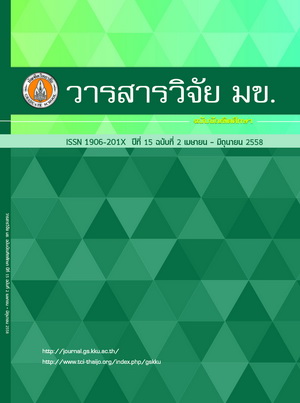Anticancer Effects of Cepharanthine on Human Colon Cancer Cells (ฤทธิ์ต้านมะเร็งของเซฟราเรนทีนต่อเซลล์มะเร็งลำไส้ใหญ่ของมนุษย์)
Keywords:
Cepharanthine (CEP) (เซฟราเรนทีน), Apoptosis (อะพอพโทซิส), Colon cancer (มะเร็งลำไส้ใหญ่)Abstract
ABSTRACT
Cyclooxygenase (COX-2) has been found to be overexpressed in various tumors including colorectal cancer. Cepharanthine (CEP), a biscoclaurine alkaloid isolated from Stephania cepharantha Hayata, exhibits anticancer activity against several different types of cancer including oropharynx cancer, leukemia, hepatocarcinoma and cholangiocarcinoma. In this study, we investigated the anticancer effects of diclofenac, celecoxib, berberine, CEP and 5-fluorouracil against a COX-2 positive human colon cancer cell line, HT-29. Of all compounds tested, CEP was the most effective agents for controlling the growth of the cancer cells. CEP could significantly induce colon cancer cell apoptosis and effectively inhibit COX-2 mRNA expression. These findings demonstrated that CEP could potentially be used as a novel anticancer agent for COX-2-positive colon cancer cells.
บทคัดย่อ
มะเร็งหลายชนิดรวมทั้งมะเร็งลำไส้ใหญ่มีการแสดงออกของ COX-2 ที่มากผิดปกติ จากการศึกษาก่อนหน้านี้พบว่า cepharanthine (CEP) ซึ่งเป็นสารในกลุ่ม biscoclaurine alkaloid ที่พบได้ในรากของต้น Stephania cepharantha Hayata มีฤทธิ์ต้านมะเร็งหลายชนิดเช่น มะเร็งช่องปากและลำคอ มะเร็งเม็ดเลือดขาว มะเร็งตับ และมะเร็งท่อน้ำดี วัตถุประสงค์ของการทดลองนี้เพื่อศึกษาฤทธิ์ต้านมะเร็งของ diclofenac, celecoxib, berberine, CEPและ 5-fluorouracil ต่อเซลล์ HT-29 ซึ่งเป็นเซลล์มะเร็งลำไส้ใหญ่ของมนุษย์ที่มีการแสดงออกของ COX-2 จากผลการทดลองแสดงให้เห็นว่า CEP สามารถยับยั้งการเจริญของเซลล์มะเร็งได้ดีกว่า diclofenac, celecoxib, berberine, และ 5-fluolouracilโดย CEP สามารถชักนำให้เซลล์มะเร็งตายแบบอะพอพโทซิสและสามารถยับยั้งการแสดงออกของยีน COX-2 การทดลองนี้แสดงให้เห็นว่า CEP อาจจะเป็นยาที่มีประสิทธิภาพในการรักษาโรคมะเร็งลำไส้ใหญ่ที่มีการแสดงออกของ COX -2


